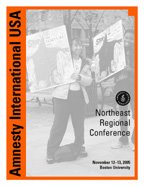Human Rights Activists Discuss Torture at Amnesty International Conference

The issue of torture was a key discussion at this year’s Amnesty International Northeast Conference held at Boston University this weekend. The Bush Administration criticized Amnesty’s annual report earlier this year which quoted Irene Khan, Secretary General of the human rights organization, as saying that the treatment of detainees at Guantanamo was “the gulag of our time.”
“There was a rallying cry by human rights activists to spotlight US practices in Guantanamo,” said Joshua Rubenstein, Amnesty’s Northeast Regional Director. “I think this is an unfortunate departure for Amnesty, but a necessary one, because the fact of the matter is that it is required by us to make that spotlight. The leading democracy in the world where we live is watering down the prohibition of torture.”
In the ensuing months members of the Bush Administration have tried to suppress the allegations of torture. General Richard Myers, former Joint Chief of Staff, was quoted on Fox News as saying that the accusations are “reprehensible.”
John Hutson, a former Navy officer and Judge Advocate General and now dean of the Franklin Pierce Law Center, said he was “ashamed” of what this administration is doing.
“It is the obligation of our armed forces to fight wars,” said Hutson. “But you have to be careful that our armed forces don’t hurt anyone unnecassarily. We have been the strongest country in the world because of our rule of law and human rights…The problem is that we think that torturing people is in our best interest. I think that this is profoundly misguided, and that this will hurt us in the future. It is absolutely clear that torture is wrong…Torture doesn’t work.”
Attendees of the conference came from all six New England states, New York and New Jersey. They were able to attend panel discussion on a wide variety of issues, such as food as a human right, international arms control, LGBT rights, HIV/AIDS, corporate accountability and media activism.
There was also a special tribute to commemorate the tenth anniversary of the assasination of Nigerian activist Ken Saro-Wiwa, who campaigned against environmental damage in his homeland and was in favour of a more equitable share of oil riches.
The keynote speaker was Krishna Pahadi, a Nepalese human rights activist who was arrested earlier this year for helping to organize a demonstration to protest King Gyandendra’s seizure of power and suspension of fundamental rights.
Dr Nazli Kibria, professor of sociology at Boston University, was also a guest speaker. She is the daughter of the former Bangladeshi Finance Minister and senior Awami Leagure leader, Shah AMS Kibria, who was killed in a grenade attack at a rally in Habiganj district in Bangladesh on January 27, 2005. A long time member of Amnesty, Ms Kibria said that her father’s assasination really made human rights activism more real and that grassroots organizing is the only way the world will become a better place.
“It is not our responsibility to not do anything,” she said.


0 Comments:
Post a Comment
<< Home